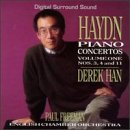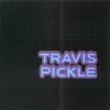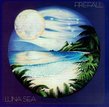| All Artists: Haydn, Han, Freeman, Eco Title: Piano Concerti 1 Members Wishing: 0 Total Copies: 0 Label: Intersound Records Release Date: 3/14/1995 Genre: Classical Styles: Forms & Genres, Concertos, Historical Periods, Classical (c.1770-1830) Number of Discs: 1 SwapaCD Credits: 1 UPCs: 015095344823, 669910230466 |
Search - Haydn, Han, Freeman :: Piano Concerti 1
 | Haydn, Han, Freeman Piano Concerti 1 Genre: Classical
|
Larger Image |
CD DetailsSimilar CDs
|
CD ReviewsDerek Han, Paul Freeman, ECO: Haydn P Ctos (3,4,11): Beauty, Dan Fee | Berkeley, CA USA | 06/05/2009 (5 out of 5 stars) "This disc is billed as Volume One of the Haydn Piano Concertos. I think that project has long since been interrupted; but getting this dis when available will pay big dividends to any listener who loves, or wants to love, these works. Our band is the redoubtable English Chamber Orchestra. Only very rarely have they ever committed anything to disc that was not strong in the running, compared to their competition. Their Haydn manners are impeccable, at least as played on modern instruments. Our pianist is Derek Han. He isn't a household big name in USA, so maybe some background info is warranted.
Mr. Han is a Juilliard School (NYC) graduate of Chinese American legacy, who won both First Prize and the Gold Medal at the Athens International Piano Competition of 1977. So what? Each year or two or three brings us a new crop of competition prize winners from somewhere. Each medalist gets the mandatory fifteen minutes of Andy Warhol fame, and then fades into the background blur of having to make a living as a working professional musician. Except. This Derek Han still has quite a lot to offer. His way with the piano reminds me of famous forebears like Dinu Lipatti, Clara Haskil, and the French pianist, Robert Casadesus. Han's tone is always limpid and absolutely without any hardness or fuzz. A keyboard run always strings together a set of well-matched tonal pearls, fast or slow or in-between. This all sounds so effortless and easy that it cannot in fact be just that effortless and easy. The piano is, as Bartok taught us, as likely to sound like a pitched percussion instrument as not, unless you bend the physical mechanism of it to some other heart or will or musical intent. By all historical accounts, this ability to make the piano do music is part of what made the instrument so interesting to composers like Mozart or Beethoven. Derek Han is a born Mozartian, and to that extent, a very apt Haydn player, too. Think gymnastics, particularly on the rings, not weight lifting. Mr. Han remains lithe and cool-headed and perfectly balanced in each and every musical moment. His sound is ever crystalline and refreshing. Think mineral spring water with natural carbonation. Our conductor is USA notable, Paul Freeman. It's a bit striking that a musician of his talents hasn't been awarded one of the premier USA music director seats. He's been shut out from big name media department marketing campaigns, like Walter Susskind and others whose music was typically better than their media reputations. As it happens, Freeman has partnered Mr. Han in a number of different discs, all nicely done. This recommend list includes Mozart, Tchaikovsky, MacDowell, and Beethoven. An ongoing release series on Albany lets us hear Freeman in some larger scale orchestra works by various, little known composers. One standout is Chicago-based soprano Patrice Michaels in French song; a sleeper that should be hyped loudly if ever there was such a disc. So, Haydn? The first concerto is No. 3, Hob. XVIII. It has the wit and atmosphere of a divertimento - outdoors music, then? - combined with more properly keyboard concerto moments where enchanting display or sheer, transparently lovely melody is the musical point. Prominent horn support and flourish help the violins and lower strings open the work. Eventually in fine classical custom, the piano enters. When the piano does arrive, Mr. Han is his usual self, letting his limpid touch unfurl everything with great poise and charm and delight. This is even more pronounced in the middle slow movement, Largo cantabile. Mr. Han is perfectly suited to the cantabile, and he can sustain the slow tempo flow with both lift and heft. The Presto finale is as lively as we expect; and distinguished by witty touches in its thematic developments and piano figurations. One begins to wonder why we don't hear these Haydn keyboard concertos more often than we actually do hear them. Surely they have sufficient sparkle and charm, like the middle Mozart concertos? Our next concerto is No. 4, Hob. XVIII. We've moved from F major to G major. Its Allegro carries on substantially, cleanly - refreshing as a pure drink from a countryside well. Mr. Han is making an excellent case for playing Haydn on the modern grand piano. I'm starting to wonder why we don't have him in fancy sets of the complete Haydn piano sonatas, or the Mozart sonatas? The middle Adagio opens with a long-breathed melody that can surely stand keeping company with Bach, Mozart, or Beethoven. With gilt woodwinds it just unfurls like a green leafy vista, announcing health and joy and rest. The piano takes this up elegantly, embellishing with trills. The supporting harmony also seems to be singing, and as the main lyric goes back to the band, the piano turns to figurations and counterpoint to enrich the melody by fabulous leaps and bounds. Chromatic tilts eventually make this melody sound more romantic and expressive than we expect from four-square, periwigged Haydn-esque stereotypes. The culmination of this Adagio is passionate, indeed etched in tenderness. The Rondo is right down to business, no nonsense, flitting about happily as a field of butterflies let loose on a very sunny day. The last concerto on this disc is No. 11, Hob XVIII. A Vivace tempo indicator gets us off and running. Of the three concertos, it's opening first movement melody will come closest to getting you humming along. Touches of Haydn's expert woodwind writing flash on and off through the strings' exposition. The piano takes over in hearty fashion, and the whole texture is close to what we expect from a pure classical concerto form. The slower middle tempo is Un poco Adagio. It moves more quickly than the intimate slow movements of concertos 3 or 4; this music lays out a more formalized sense of social occasion in its textures and melodies. The intellectual sides of musical beauty are drawn out, with Mr. Han pacing the band in exquisitely poised rubato touches. A Hungarian Rondo wraps up the concerto with music of brilliance and style for both keyboard and band. This eleventh sounds closest to the standard models we will later associate with early to middle Mozart or early Beethoven. The outdoors, garden party divertimento has faded, leaving on a full classical concerto as its progeny. Gee this disc might be Haydn concertos for people who don't particularly think of themselves as Haydn fans. Given how little we know these works, we are fortunate to have such a high-level musical introduction. And, yes, there is a volume two if you can find it. I note that the disc says it can be decoded into surround sound, so maybe that master tape could be remastered in super audio surround channel format? Both Haydn volumes are highly recommended. Mr. Han and Mr. Freeman deserve to be much more appreciated than their sleeper media reputations might suggest. Playing like this just cannot be taken for granted. Five starry stars. Not least for the composer, Haydn?" |

 Track Listings (9) - Disc #1
Track Listings (9) - Disc #1


